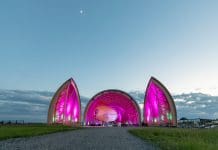Reds10 is advancing plans to deliver over £45m of new school-build projects for the Department for Education’s £3bn offsite schools framework
Reds10 is delivering over £45m of works for the new school buildings, which are part of the first wave of new MMC schools to be built in the next four years.
The first project to reach contract award on the framework was Reds10’s Abbey Farm Educate Together Primary School in Swindon, which was submitted for planning just 13 weeks after appointment and is aiming to achieve net zero operational carbon. Works on site started this week.
The new Oak Tree SEN School in Winnersh, which completed its school engagement phase in mid-April, will form part of the Maiden Erlegh Trust Academies, providing 150 spaces, catering for both primary and secondary school age pupils with social, emotional, and mental health needs (SEMH) and/or Autistic Spectrum Condition (ASC).
Other schools Reds10 is currently progressing under the framework include:
- Kent SEND School – the first SEND school on the Isle of Sheppey,
- Havering SEND School – an all-through 60 place SEND school in the Metropolitan Green Belt, due to achieve a 0.4 Urban Greening Factor, and;
- Waterside Primary Academy in Nottingham, part of the DfE’s Pathfinder Programme, which is being used to establish the future sustainable schools’ matrix.
Paul Ruddick, CEO Reds10, said: “Proudly, Reds10 has played a central part in driving forward the first set of projects under the framework.
“Our role has placed us at the centre of stakeholder engagement, encouraging close collaboration with DfE, local authorities, the end users and the design team to optimise the value that MMC can bring.
“One year on, and it is already making a significant difference, with the best of MMC being showcased and a new standard being set for what can be delivered within budget and at real pace.”
The new framework was established in early 2020 to cultivate innovation and modernise the industry by increasing the adoption of MMC in the market.
It is aimed at driving greater efficiency, innovation and cost savings within DfE capital building programmes, improving its ability to successfully procure and deliver new buildings within budget and at pace.













